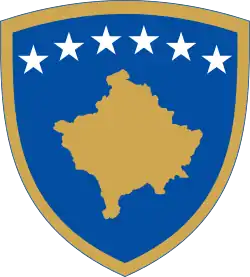Assembly of the Republic of Kosovo
 |
|---|
| This article is part of a series on the politics and government of Kosovo |
| Constitution and law |
Assembly of the Republic of Kosovo | |
|---|---|
| 7th Kosovan Assembly | |
 | |
| Type | |
| Type | |
| Leadership | |
Besa Gaxherri, LDK | |
| Structure | |
| Seats | 120 |
 | |
Political groups | Government (59)
Supported by (6) Opposition (55) |
| Elections | |
| Open list Party-list proportional representation | |
First election | 17 November 2001 |
Last election | 6 October 2019 |
Next election | 14 February 2021 |
| Meeting place | |
 | |
| Assembly Building, Pristina, Kosovo | |
| Website | |
| http://www.kuvendikosoves.org/?cid=2,1 | |
The Assembly of the Republic of Kosovo (Albanian: Kuvendi i Republikës së Kosovës; Serbian: Скупштина Републике Косово, Skupština Republike Kosovo) is the legislative institution of the Republic of Kosovo[a] that is directly elected by the people every four years. It was originally established by the United Nations Interim Administration Mission in Kosovo in 2001[1] to provide 'provisional, democratic self-government'. On February 17, 2008, representatives of the people of Kosovo[2] unilaterally declared Kosovo's independence and subsequently adopted the Constitution of Kosovo, which came into effect on 15 June 2008.
The Assembly of the Republic of Kosovo is regulated by the Constitution of Kosovo and has 120 directly-elected members; 20 are reserved for national minorities as follows:
- 10 seats for the representatives of the Serbs.
- 4 seats for the representatives of the Romani, Ashkali and Egyptians.
- 3 seats for the Bosniaks.
- 2 seats for the Turks.
- 1 seat for the Gorans.[3]
Albanian is the official language of the majority, but all languages of minorities such as Serbian, Turkish and Bosnian are used, with simultaneous interpretation.
Committees
The Kosovo Assembly has 19 committees:
- Budget Committee
- Committee for Finance and Economy
- Committee for Education, Science and Technology
- Committee for Health
- Committee for Labour and Social Welfare
- Committee for Public Services
- Committee on Foreign Affairs
- Committee on Judicial, Legislative and Constitutional Framework Matters
- Committee on Missing Persons – it is a relatively unique committee that deals with the issue of large number of missing persons and prisoners of war as a result of the Kosovo War.
- Committee on Media
- Committee on the Rights and Interests of Communities
- Committee for Trade and Industry
- Committee for Culture, Youth and Sports
- Committee for Environment and Spatial Planning
- Committee for Transport and Communications
- Committee for Agriculture, Forestry and Rural Development
- Committee on Emergency Preparedness
- Committee on Public Petitions and Claims
- Committee on Gender Equality
Most recent election results
| Party | Votes | % | Seats | +/– | |
|---|---|---|---|---|---|
| Vetëvendosje | 221,001 | 26.27 | 29 | –5 | |
| Democratic League of Kosovo | 206,516 | 24.54 | 28 | +5 | |
| Democratic Party of Kosovo | 178,637 | 21.23 | 24 | +1 | |
| 100% Kosovo (AAK–PSD) | 96,872 | 11.51 | 13 | +3 | |
| Serb List | 53,861 | 6.40 | 10 | +1 | |
| NISMA–AKR–PD | 42,083 | 5.00 | 6 | –4 | |
| Vakat Coalition | 7,075 | 0.84 | 2 | 0 | |
| Turkish Democratic Party of Kosovo | 6,788 | 0.80 | 2 | 0 | |
| Egyptian Liberal Party | 4,887 | 0.58 | 1 | 0 | |
| New Democratic Party | 3,935 | 0.47 | 1 | 0 | |
| Ashkali Party for Integration | 3,113 | 0.37 | 1 | 0 | |
| Fjala | 2,852 | 0.34 | 0 | 0 | |
| Democratic Ashkali Party of Kosovo | 1,957 | 0.23 | 0 | 0 | |
| Independent Liberal Party | 1,859 | 0.22 | 0 | –1 | |
| New Democratic Initiative of Kosovo | 1,755 | 0.21 | 1 | 0 | |
| Euroatlantic Party of Kosovo | 1,173 | 0.14 | 0 | New | |
| Unified Party of the Gorans | 1,159 | 0.14 | 1 | 0 | |
| United Roma Party of Kosovo | 1,078 | 0.13 | 1 | 0 | |
| Party of Democratic Action of Kosovo | 834 | 0.10 | 0 | 0 | |
| Party of Kosovo Serbs | 816 | 0.10 | 0 | 0 | |
| Civic Initiative of Gora | 785 | 0.09 | 0 | 0 | |
| Movement for Gora | 695 | 0.08 | 0 | 0 | |
| Serb Coalition (Sloboda) | 672 | 0.08 | 0 | New | |
| Kosovar New Romani Party | 289 | 0.03 | 0 | 0 | |
| Independents | 577 | 0.07 | 0 | New | |
| Invalid/blank votes | 35,088 | – | – | – | |
| Total | 879,209 | 100 | 120 | 0 | |
| Registered voters/turnout | 1,961,213 | 44.83 | – | – | |
| Source: KQZ, KQZ, KQZ | |||||
Notes
| a. | ^ Kosovo is the subject of a territorial dispute between the Republic of Kosovo and the Republic of Serbia. The Republic of Kosovo unilaterally declared independence on 17 February 2008. Serbia continues to claim it as part of its own sovereign territory. The two governments began to normalise relations in 2013, as part of the 2013 Brussels Agreement. Kosovo is currently recognized as an independent state by 98 out of the 193 United Nations member states. In total, 113 UN member states recognized Kosovo at some point, of which 15 later withdrew their recognition. |
References
- "Constitutional Framework for Provisional Self-Government"
- "Archived copy" (PDF). Archived from the original (PDF) on 2010-07-23. Retrieved 2012-08-19.CS1 maint: archived copy as title (link)
- ""
External links
- Official website (in English, Albanian, and Serbian)
- Constitutional Framework